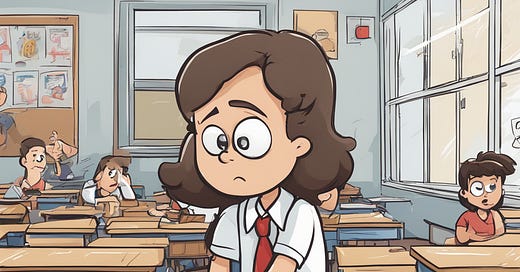There was an incident that happened that made me curious about what educators find as cheating and what is being resourceful?
The scenario: an emerging multilingual student got help on campus from a trained college student who provides high-dose tutoring at one of my school sites.
Teacher perception: The essay was really advanced. The tutor told them they heavily supported the student. The student did not write it themselves. They are cheating.
Student perception: The tutor helped them as they were learning English as well, and it was not cheating.
This was very emotional for the student because it was the difference between passing or not passing the class. The student admittedly did not do their best work this grading period. This assessment would provide the evidence needed to see if the student met the Guaranteed Viable Curriculum.
My initial thoughts: Students have been getting supported by tutors for decades. It has always been a gray area in education. Families with financial power have been able to justify their student’s high scores via the use of tutors. As we bring in tutors to accelerate learning, this can be true, too.
The question I asked the educator was: Is this a tutor training problem, or did the tutor pushed the student aside and said, “Let me do it.” I trained the tutors myself, and they have had a semester class on tutoring, so I have a feeling neither of these was true.
But it made me think…in today’s age of technology, seamless translation, and AI…WHAT IS CHEATING?
I have maintained that we as educators need to change and challenge what assessments are. I believe AI should be used for boring stuff, and we should be creating building, and expressing with multiple art forms, writing included.
As we consider assessments, some non-negotiables for me are
Objectives of learning (explain the why).
Rubrics (preferably on a 4-point scale)
Student personal reflection, relationship to the learning, or a personal aspect/real-life example of how that learning can be applied to a student’s life. It has to be relatable. Students have to talk about the relationship in some form (writing, speaking, demonstration, Q and A, etc.)
In my experience, students cheat due to executive functioning (poor planning and being rushed to the hard deadline) or due to lack of skill (they do not know how to do better). When you add these three non-negotiables, I am hard-pressed to find an AI that will do the assignment and a student will be able to credibly turn it in and reflect on it or have a conversation about the assessment. In theory, PBL should eliminate cheating or what we have traditionally thought of as cheating. You can’t make these assessments up.
So going back to the scenario above. I have a hard time with this discipline because it could have been avoided. Research and Education experts have been pleading for teachers to move away from the traditional 5 paragraph essay for years. They are inequitable to language learners and an outdated way to show what you know. As a former ELA teacher, at the end of my time in the classroom, I got so bored of reading boring essays, and students got tired of writing boring essays. So what did I do? Blogs, Podcasts, scripts, personal journals, high-interest journals. All mentor texts I found were relevant, and we mimicked the style, structure, or mood/tone/symbolism. Students knew why they were writing, the learning directly made a correlation to the assessment, and we didn’t write to write.
Yes, students need to know how to write. We need copywriters, editors, content creators, scripts, journals, articles, and poems. We need it all.
Before a teacher starts to look for cheating, I hope that they look at their authentic assessments and question why a student would cheat. Is this assessment cheat-worthy? If so, why? How?
We can teach students to use AI and critical thinking.
We can have students be tutored and critically think about what they learned.
We can use technology as a tool.
So, what is modern-day cheating to me? It is only the most blatant cheating there has been for a very long time, turning in someone else’s assignment. But again, there is rarely a time that this does not come out when you have a student reflect on it or have other students ask questions about it. If students have to defend their work, they will be less likely to turn in the same thing someone else did the year before. I would also encourage educators to make slight changes or continue to add relevancy to assignments so if connecting it to a relevant problem in society…the nuances of those problems change from year to year.
Most cheating I have experienced is not cheating. It is a lack of authentic assessments. This is something I find unfair to discipline when it is out of opportunity. The best test of an authentic assessment is if you google it and find examples online…it is NOT AUTHENTIC. Let me know if you would like some ideas on authentic assessments! They are my favorite things to create!
*This article was written using Grammarly (AI), the photo was generated by AI.




